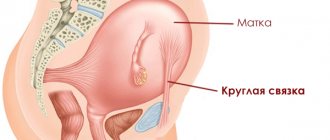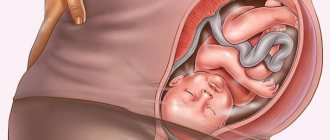is a pathological condition that is characterized by a violation of the integrity of the walls of the uterus during labor. The main clinical manifestations include sharply painful, intensified contractions, difficulty urinating, signs of blood loss and the erectile or torpid phase of shock. Diagnosis of uterine ruptures is based on preliminary collection of anamnesis and identification of characteristic symptoms, and, if necessary, ultrasound data. Therapeutic tactics consist of delivery by cesarean section, midline laparotomy or fetal destruction operations with stopping bleeding, stitching the rupture or extirpation of the uterus in the future.
Symptoms accompanying uterine enlargement
Most often, changes in the size of the uterus are asymptomatic, or the signs that appear are attributed to other reasons, so the woman is not even aware of its enlargement. This is revealed only during a medical examination or ultrasound examination, which is why it is important to visit a gynecologist regularly.
Some symptoms accompanying an enlarged uterus are similar to signs of pregnancy in the first weeks, so if you have such suspicions, you need to take a pregnancy test and if the result is negative, you should consult a doctor to find out the cause of this condition.
You also need to know how else an enlarged uterus can manifest itself, and if you notice these symptoms, you should definitely visit a gynecologist:
With careful attention to the state of her health, a woman can always catch the changes that are occurring and promptly seek medical help in order to figure out why this is happening.
Menstruation and physiological ailments
Many women experience uterine pain during menstruation. The causes of this symptom are often physiological. Every second representative of the fairer sex complains of dysmenorrhea. However, on other days the woman’s health remains normal. Pain in the uterus appears 1-2 days before menstruation and ends on the 2-3rd day of bleeding.
Dysmenorrhea has no unpleasant consequences. It is important to contact a gynecologist in time and make sure that there are no other abnormalities. Many women report that monthly pain and discomfort go away after giving birth. Why is still a mystery.
Main reasons
The causes of uterine enlargement can be either natural and harmless or dangerous and pathological. Let's take a closer look.
Natural reasons:
- Menstruation.
- Menopause.
During pregnancy, the uterus changes and enlarges in accordance with the growth and development of the fetus; this process begins at approximately 5-6 weeks of pregnancy.
The increase occurs as a result of the formation of new muscle fibers, their lengthening and thickening. After the baby is born, the uterus returns to its previous state in about 6-8 weeks.
If uterine enlargement is observed before 5 weeks, the cause may be multiple pregnancy, early ovulation, incorrect calculation of the gestational age, or the development of pathology, so mandatory medical supervision is required.
During the menstrual cycle, the uterus changes in size under the influence of hormones, the main of which is progesterone. Before the onset of menstruation, the body of the uterus enlarges, and the cervix softens and opens slightly. After menstruation, the organ shrinks and closes.
With age, the female reproductive organs increase in size, and an enlargement of the uterus before menopause is also considered normal.
In postmenopause, size norms are approximately as follows:
- length – 8cm;
- width – 5 cm;
- anterior-posterior size – 3.2 cm.
If the uterus is enlarged, there is no menstruation, and the pregnancy test is negative, then the reasons may be pathological, the main ones being:
- Myoma.
- Oncology.
- Endometriosis.
- Cervical hypertrophy.
One of the most common causes of unnatural changes in the size of the uterus. It is a benign tumor that occurs during spontaneous active division of cells in the muscle layer.
The size of the uterus with fibroids is usually described in weeks. This means that the enlargement of the organ due to fibroids is compared with its corresponding size, characteristic of a certain week of pregnancy.
If fibroids are detected early, hormonal therapy is sufficient to eliminate them. If the disease is advanced, surgical intervention will be required.
Oncology is the most dangerous of all possible causes. A malignant tumor usually forms in the mucous membrane and is more common in women who have entered menopause. Also at risk are obese women, which means they should carefully monitor the condition of their reproductive system.
Endometriosis is a fairly common disease in which abnormal growth of endometrial cells occurs beyond this layer, resulting in an increase in the size of the uterus. Moreover, the anterior-posterior size mainly increases and therefore it acquires a spherical shape.
Diffuse endometriosis is distinguished separately, in which endometrial cells penetrate into the tissue of the uterus, capturing it evenly, i.e. There is no specific focus of organ damage, which complicates the treatment of this disease.
Endometriosis often does not manifest itself, especially in the initial stages, but it disrupts the periodicity of menstrual cycles. Therefore, if, when menstruation is delayed, the pregnancy test turns out to be negative, you should not postpone your visit to the gynecologist. After all, if the disease is not diagnosed on time, it can lead to infertility.
With cervical hypertrophy, only an enlargement of the cervix is characteristic, due to the thickening of its walls. Most often, it can appear as a result of some kind of inflammatory process in the cervical canal.
Therefore, the main thing in treatment is to eliminate the causes of inflammation using antibiotic therapy.
As can be seen from the description of the main reasons for the increase in the size of the uterus, the main thing is to detect the problem in time or make sure that it does not exist. When diagnosis is made in a timely manner, it is much easier to cope with the disease and avoid unpleasant consequences.
You are planning to have a baby or, in any case, you are not against having a child in your family. This means that every month you anxiously listen to your body, trying to figure out if you are pregnant. There is still a week or two until the moment when the cherished two stripes show (or do not show), but changes in your body have already begun, and, often, their signs are quite obvious. But what do they mean?
Sibling mothers shared their impressions of the first days of pregnancy in the topic “”, and we collected statistical data on the most common first signs of pregnancy.
Norm
Why is the uterus enlarged? The reasons and photos of this phenomenon will be presented in the article. However, before this, it is worth talking about generally accepted norms. The size of the reproductive organ can be determined during a gynecological examination. However, the data obtained will only be approximate. More accurate information is provided during ultrasound diagnostics.
Normally, the size of the reproductive organ is in the range from 3 to 5 centimeters. In this case, the length, width and height of the uterus are calculated. The body is pear-shaped and located in the pelvis. As the uterus enlarges, it becomes more like a ball and can sometimes extend beyond the pelvic bone. Let's find out why the uterus may be enlarged (reasons).
Normally, a woman in the early stages may not feel that she is pregnant. This is typical for healthy and young expectant mothers. For most, the very first sensations are very atypical, so you can find out about conception only after a delay and a test.
It’s worse if you previously had all the signs of toxicosis (malaise, nausea), swelling and pain in the mammary glands, and then they disappeared, but bloody discharge appeared. These are signs that the pregnancy has stopped developing. You need to urgently visit a gynecologist.
Emotional instability
4%
expectant mothers noted that they became irritable, whiny, nervous, or suddenly stopped loving those activities that always gave them pleasure. Many people compare their condition with the sensations before menstruation (premenstrual syndrome, PMS). It should be noted that this symptom is probably more common; it’s just that not all women are able to objectively assess their behavior. If you have reason to believe that you are pregnant, listen to those around you; perhaps their comments are not nitpicking at all!
: Two days before the test, she started growling at her husband! I’m going crazy, I understand that I’m behaving inappropriately, but I can’t help it!
: And my first pregnancy started with fright. Well, I’m not very timid at all, but suddenly I started to flinch at the slightest sound.
Early pregnancy and discomfort
Is it dangerous if the expectant mother has a sore uterus? The causes during pregnancy are often hidden in hormonal imbalance. In early gestation, the corpus luteum secretes progesterone. This hormone is necessary for relaxation of the uterus; sufficient levels prevent miscarriage. If there is little progesterone, then the reproductive organ becomes toned and begins to contract. The consequence of this process may be termination of pregnancy. But if you see a doctor in time, then everything can be fixed.
The uterus may hurt in the early stages due to accelerated growth. This happens especially often in women who have previously suffered from infectious diseases and have adhesions. As the uterus enlarges, these films stretch, causing discomfort and pain. This process does not pose any danger, but you must inform your gynecologist about any complaints you have.
Heightened intuition
3%
mothers “simply knew” about their condition from the first day after conception. Women also wrote that maternal feelings suddenly awoke in them, all thoughts were about pregnancy and children
: My suspicions began when I was given a very cute baby doll for New Year, and I began to feel a very strange tenderness for him, which is definitely not my style. And when my husband lifted him by the leg, she completely fell into hysterics from horror!
: The very first sign, I think, was selective vision: wherever I look, there are either pregnant women or mothers.
: I physically didn’t have any sensations, I woke up one morning, and I was blinded (seriously) - I’m pregnant!
: I felt my first pregnancy the day after the supposed conception. I had a clear feeling that I was pregnant! In the morning we were walking to the car, and I asked my future husband: “What if I’m pregnant?”
Cramping pain during early pregnancy
In the early stages of pregnancy, cramping pain is dangerous; it can mean an impending or incipient miscarriage. This complication is characterized by:
- pain above the pubis and in the lower back;
- bleeding from the vagina;
- severe weakness.
Increased nausea and fever are also possible. If there is a threatened abortion, there is a chance to continue the pregnancy. To do this, you need to call an ambulance for hospitalization in the gynecological department. Self-medication is not recommended.
In late pregnancy, the uterus may hurt for physiological reasons. The reproductive organ is preparing to expel the fetus. The uterus periodically contracts, causing discomfort. There is no danger in this if these are training contractions. Report them to your doctor.
The uterus can also hurt due to the threat of premature birth. If at the same time you experience unusual discharge, your water breaks, or other symptoms occur, you should immediately go to the hospital. The consequences of these processes can be very different.
If your due date has come and your uterus is very sick, then collect the necessary things and go to the maternity hospital.









